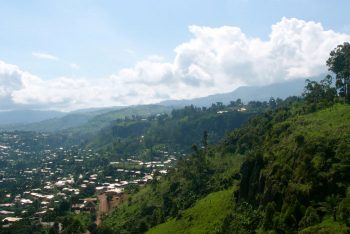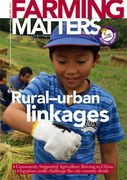As cities continue to expand and ever more people migrate to urban areas, current unsustainable patterns of urbanisation and ineffective policies are no longer acceptable. The typical approaches that maintain the separation between rural and urban neglect all of the ways that connect both worlds. And nowhere else are rural and urban areas more linked than within the food system.

A revolutionary change in the food system is not global; it is small scale and locally based
The expansion of cities and their increasing demands for food is paired with the challenges of improving rural livelihoods. Unsustainable consumption and trade continue to grow, and in particular the continued corporate takeover and dominance of the food and agriculture sector. This has left many urban families and their communities without access to affordable, nutritious, safe and fresh food. At the same time, these practices disenfranchise small scale food producers and rural people, reduce rural livelihoods opportunities and exacerbate rural poverty. This begs the question – how can we make better development decisions based on a more inclusive framework?
Urban–rural linkages in the food system
Rural–urban linkages can be best supported through making real change in the food system. The food system itself is complex and many-layered, including flows, exchanges and impacts across rural and urban areas – from food production, distribution, processing, marketing, consumption and waste, as well as supportive infrastructure.
A revolutionary change in the food system is not global; it is small scale and locally based.
Many issues and interventions are being discussed by governments and civil society that seek to better connect areas through territorial approaches to governance at the local level. Improved relationships between producers and consumers, which also support vulnerable populations in rural and urban areas, are vital. For many communities, this means preserving traditional and public market spaces, improving social protection and food support programmes, amending public procurement policies, and supporting direct purchasing schemes and community supported agriculture, are some of the many interventions that are needed
Local governments and authorities
Decentralisation of power and clear guidance for local authorities is key to carrying out international policy commitments and human rights obligations to support integrated rural–urban planning. Food systems are particularly important in this regard, as law and policy that dictate food waste, labour conditions and livelihood improvement, public procurement, land for food (including public land), zoning for urban and peri-urban food cultivation and production, and food retailer placement, among others, are often in the hands of city, municipal or regional authorities.
There are some key players currently leveraging this sort of change. For many years local government networks, including ICLEI: Local Governments for Sustainability and their annual Resilient Cities Forum, as well as the United Cities and Local Governments (UCLG) link local and regional governments together from cities of all sizes. Such networks seek to insert the needs and experiences of the local level into international policy processes as well as to build the capacity at the local level to engage directly with inhabitants, including those in peri-urban and rural areas away from urban centres.
From ‘city’ to ‘city region’
Cities do not exist in a vacuum and urban and rural linkages must be present in any ‘urban’ goal or plan for development
Urban– rural linkages are also a fashionable topic in international policy discourse. They are discussed in international processes such as the preparations for the Third United Nations Conference on Housing and Sustainable Urban Development, or Habitat III, due to take place in Quito, Ecuador in October 2016. Similarly, the development of the Post-2015 Agenda and the Sustainable Development Goals, the controversial, corporate-dominated Global Expo in Milan, and local government initiatives including the Seoul Declaration and the Urban Food Policy Pact, all seek to address the challenges that urban areas pose by creating stronger local and regional frameworks.
Although there are many doubts and complications of the process and outcomes (such as the lack of meaningful inclusion of civil society) the Post-2015 Agenda and the Sustainable Development Goals have had important effects related to urban–rural linkages. Importantly, it led to the streamlining of territorial approaches to governance, also referred to as city regions. This is a new concept. The development of Sustainable Development Goal 11 to ‘make cities and human settlements inclusive, safe, resilient and sustainable’ and the work by groups such as the Communitas Coalition and the City Region Food Systems collaborative has really changed the way we think about what is ‘urban’. They mainstreamed a new conception of the ‘city region’ as a replacement for the ‘city’ as our framework for reference when discussing sustainable urban development. Cities do not exist in a vacuum and this conception makes clear that urban and rural linkages must be present in any ‘urban’ goal or plan for development.
Democratising local food policy

The current development of the Urban Food Policy Pact led by the City of Milan has engaged some 45 cities across the globe to share their experiences, challenges and needs in implementing local food policy. The pact seeks to create a governance framework for city region approaches, as well as participatory decision making directly with civil society and small scale food producers, covering topics including governance, poverty alleviation, sustainable diets and nutrition, food production, supply and distribution, and food waste and loss. This is an important step to answer the question how local governments can improve governance and management of rural areas. It also addresses the need for food systems governance to be democratic and participatory, addressing the critical role of civil society in making those decisions in multi-stakeholder governing bodies at the local level. Food policy councils, collaborations between citizens and government officials, providing a forum for advocacy and policy development to create sustainable and just food systems, for example.
The City Region Food Systems collaborative is currently working together with different cities, civil society and international bodies and processes to advocate for integrated food systems planning or city region food systems. Urban areas are not the exclusive domain of any single set of actors or inhabitants, and rural communities have the right to benefit from urban development and vice versa. Technical solutions to feeding urban areas, as well as climate change, labour, climate change and investment must integrate the rural areas, as well as manage ecosystem services.
Meaningful changes
Although there is a resurgence of interest in the topic, stronger urban and rural links are not new. The original commitments in the 1976 Vancouver Declaration at the first UN conference on human settlements (Habitat I), and the Istanbul Declaration signed in 1996 at Habitat II recognised the critical links between rural and urban areas, and the need for balanced and holistic approaches to development.
Habitat II went further, declaring that local authorities and general decentralisation of power structures are critical to implement and support these linkages. However, the initial preparations for Habitat III and the continued direction of the UN-Habitat process make clear that these past commitments have been forgotten as they proceed with a solely ‘urbanist’ agenda. Pressure by civil society actors has resulted in a working group on rural–urban linkages within the Habitat process to closely follow the issues of city region food systems and land use. However, it remains to be seen if this will result in meaningful changes towards a more balanced and integrated urban–rural development.
Looking forward
Looking towards Habitat III and the other emerging policy discussions, ‘the right to the city’ framework has become an important civil society and local government approach to the management of the city and its rural hinterlands. The right to the city advocates equitable use of urban space according to the principles of sustainability, democracy, equity and social justice. It is a collective right of the inhabitants of the cities and the surrounding areas, giving priority to vulnerable and disadvantaged groups. It is a framework and approach that at its heart, seeks to promote the realisation of human rights and protection of marginalised communities, through participation, respect to the social function of land, property and the city region, and the sustainable management of the commons. This framework also acknowledges the role that social solidarity economy plays in supporting many communities, and it is imperative that these contributions are recognised in international policy.
As we continue to fill and expand urban spaces, it is critical that we reconfigure how we understand these spaces, and how they are governed, how they interact and impact other territories, and how peoples in and around them can lead dignified lives. There are many exciting opportunities, but each also has many challenges and risks. Civil society, from urban inhabitants to rural producers, must play meaningful roles in setting the agenda at the global and local level, and once set, it is up to local actors to implement policies and create real change.
Emily Mattheisen
Emily Mattheisen works for Habitat International Coalition – Housing and Land Rights Network, a global network that supports the defence, promotion and realisation of human rights related to housing and land in both rural and urban areas. Emily co-coordinates the urban food and nutrition constituency of the Civil Society Mechanism of the UN Committee on World Food Security.
Email: emattheisen@hic-mena.org

